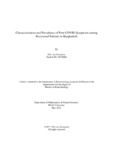Characterization and prevalence of Post-COVID symptoms among recovered patients in Bangladesh

View/Open
Date
2022-05Publisher
Brac UniversityAuthor
Sharmeen, Iffat AraMetadata
Show full item recordAbstract
Among the developing nations, Bangladesh was one of the countries severely impacted by
the Covid-19 pandemic. The healthcare sector was overwhelmed with patients, and economic
development came to a halt. Returning back to a normal lifestyle have been incredibly
difficult for survivors due to certain effects of the disease that persist even after recovery.
Termed ‘long-Covid’ or ‘post-Covid’ symptoms, these symptoms have not yet been widely
studied in Bangladesh, although research has already taken momentum in other countries,
particularly developed nations. This paper was one of the first to study the prevalence of
these symptoms among recovered patients in Bangladesh, a developing nation, and also find
out the possible risk factors associated with the severity of post-Covid symptoms. The aim
was to understand these symptoms and also find out risk factors and treatment effects, so that
survivors can be better rehabilitated. Significant risk factors found include male sex below or
equal to the age of 40, occupation that requires frequently going outside, female sex with
unhealthy BMI, comorbidities such as chronic urological disease, severity and duration of the
Covid-19 disease. 77.7% survivors who opted for medication noted significantly better
improvement in conditions after 2 months of tolerating post-Covid symptoms compared to
those without medication. This study also found 19.7% of survivors who took medication
possibly suffering from long-Covid, and 28% possibly suffering from long-Covid without
medication. This study recommends urgent medical, psychological, and social support to
Covid survivors for improvement in their quality of life, particularly survivors working in the
healthcare and emergency sectors. This will help alleviate the disease burden of Covid-19 in
the country and help healthcare facilities to be more capable of managing patients in the
future. Routine follow-up is necessary to reduce re-infections, re-hospitalizations, and
overwhelming healthcare facilities.
